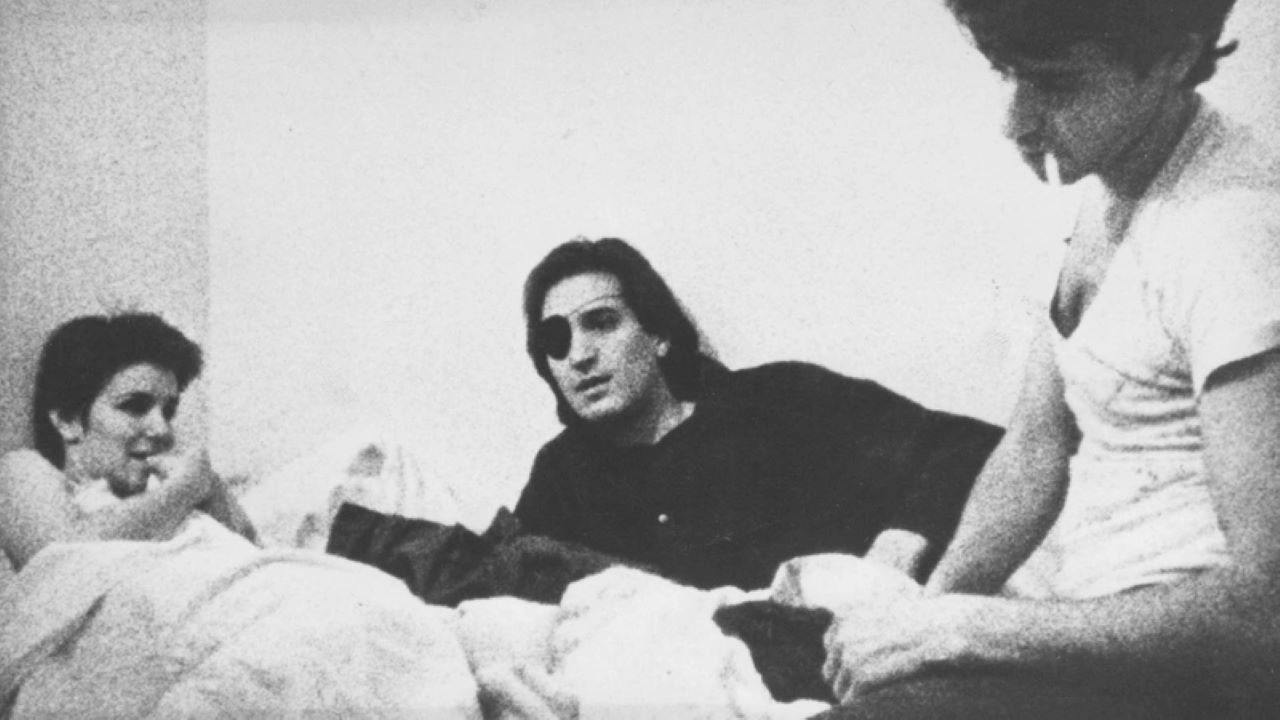The line between just being friends and being fuck buddies is a hard one to put your finger(s) on. When does being friendly turn into flirting? At what point does a platonic friendship of trust and closeness transform into an intimately sexual romance? Or scratch the romance—what about sex for the sake of having a fun time? Can friendship exist post-climax? These questions recur throughout most of Gregg Araki's films, but his feature debut, Three Bewildered People in the Night (1987), is a rarely shown work that clearly displays an interest in the major themes of sex and existentialism that Araki frequently returns to in his later movies, particularly his 1993-1997 Teenage Apocalypse trilogy (Totally Fucked Up, The Doom Generation, and Nowhere). A new restoration of Three Bewildered People from Strand Releasing screens tonight at IFC Center as part of “Cruising the Movies,” their queer monthly series programmed by Elizabeth Purchell and KJ Shepherd.
Shot with a crank Bolex, Three Bewildered People opens with a pay phone call that sets the tone for much of Araki's future filmography: "Just the usual angst and despair. I don't know what the fuck it is I want anymore. Everything bores me: sex, art, life." Enter David, a gay artist with an upcoming gallery show; his best friend, Alicia, a 25-year-old video artist in school; and Alicia's photographer boyfriend and roommate, Craig. David and Alicia have a long and close history, but when he meets Craig, the two start spending more and more time together, especially since Alicia is often absent to work on her video editing. To show the evolving tense relationships between each pair of the triangle, Araki and his $5,000 budget station at late-night diners, quick-e mart convenience stores and gas stations, the passenger seat of car rides, and barren apartment bedrooms.
A stand-out aspect of the film is the dated nature of technology and the culture of their daily lives. Gas costs 99 cents. TV is a CRT cube. Photos are viewed on a slide projector. Love tokens include printed 35mm photographs and mix tape cassettes. The absence of contemporary digital technology is noticeable, but reminds us that before being online all the time, attention was given by simply being together, the hard and soft of tangible physicality, and material mementos. Even Alicia's video project, a mysterious piece in which she addresses her camera in a diaristic confessional—a device that Araki reuses with more nuance in Totally Fucked Up—is a record of her private life committed to a physical medium of time.
While the trio grows closer by bonding in pairs over their mutual affection for each other, and their shared annoyances with the meaninglessness of their Los Angeles lives, Three Bewildered People is a tame rough draft of the same scenes and motifs exalted in vibrant colors throughout the Teenage Apocalypse trilogy for which Araki would gain a cult fandom, followed thematically by the later Kaboom (2010). In comparison, Three Bewildered People is like a table-reading: the dark black-and-white footage, the lack of any on-camera sex scenes, the quiet uber-realism of hanging out with nothing to do. But considering how much of it is echoed in his later films, Three Bewildered People is a must-watch for any Araki fan: the film's themes, shooting style (often without the right permits), locations, and use of young actors philosophizing about their place in the world are all aspects seen reworked repeatedly, which makes watching Araki's filmography an unusually rewarding experience for letting viewers see a style develop and evolve in close contrast to each preceding effort. While Araki has made several films that depart from this stylistic signature, Three Bewildered People is a remarkable starting point for presenting a rundown of timeless interests he returned to and revised repeatedly over decades. The question of "What's the point of anything?" never does get old.
Three Bewildered People in the Night screens this evening, January 6, at IFC Center as part of the series "Cruising the Movies."



